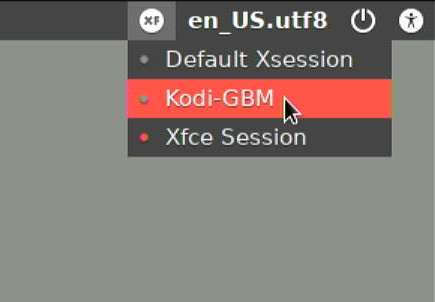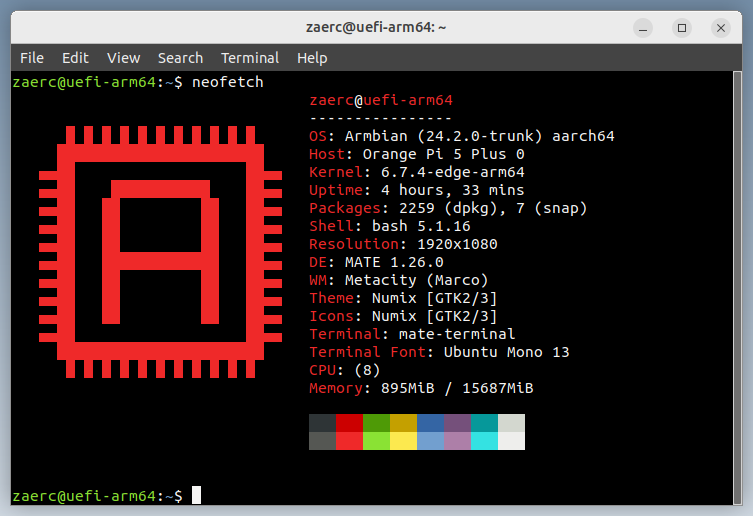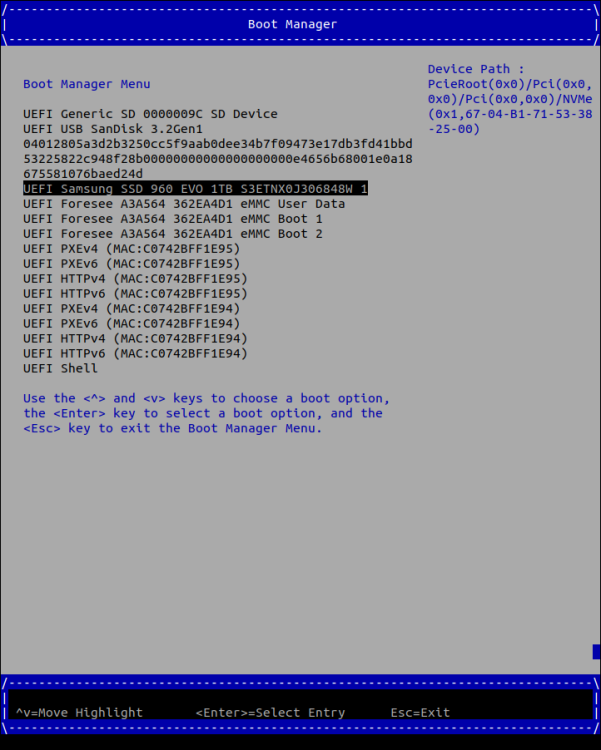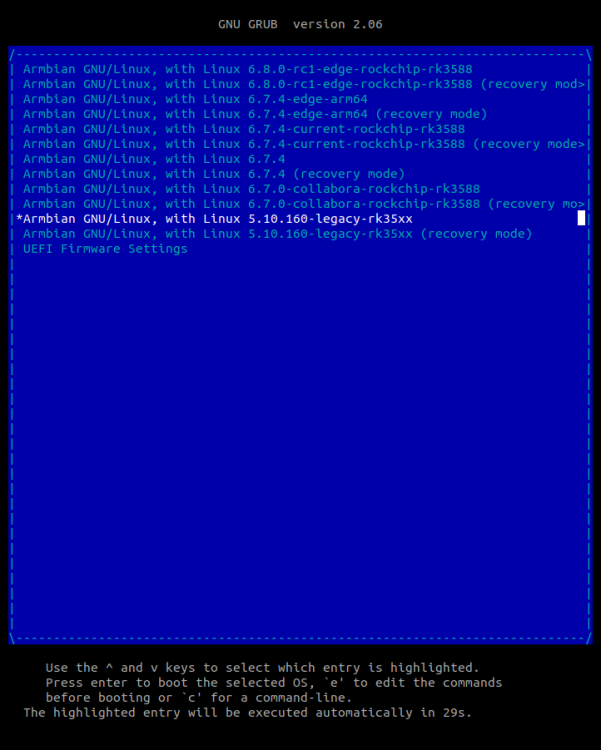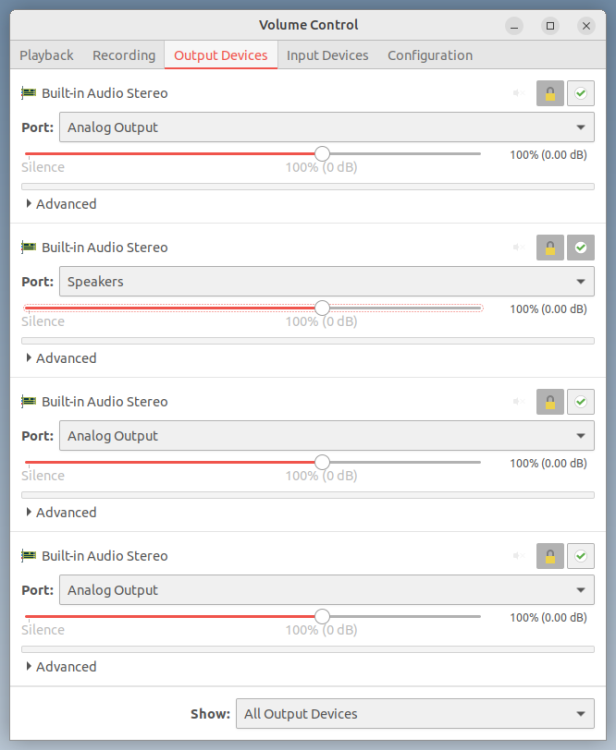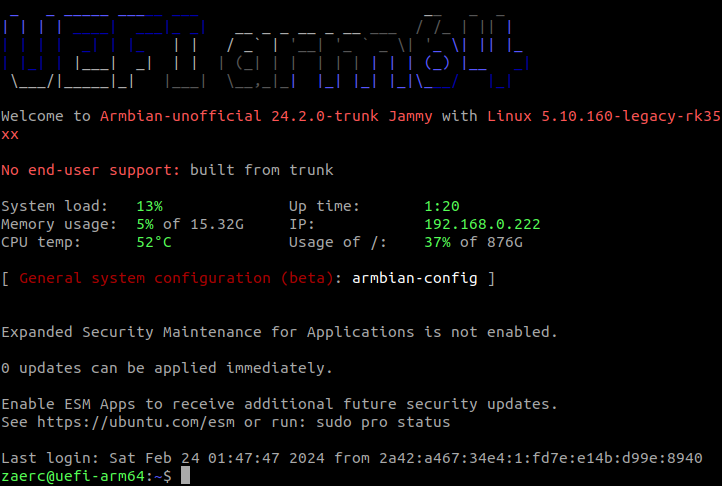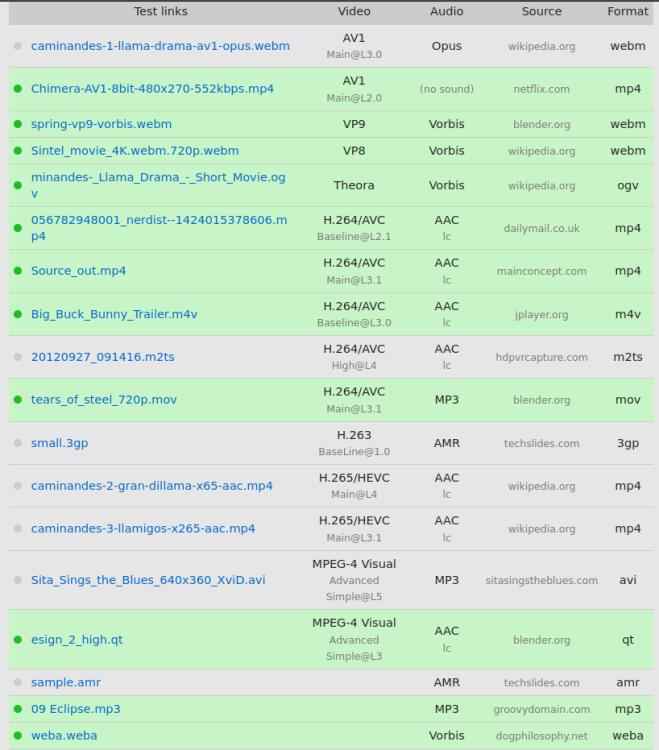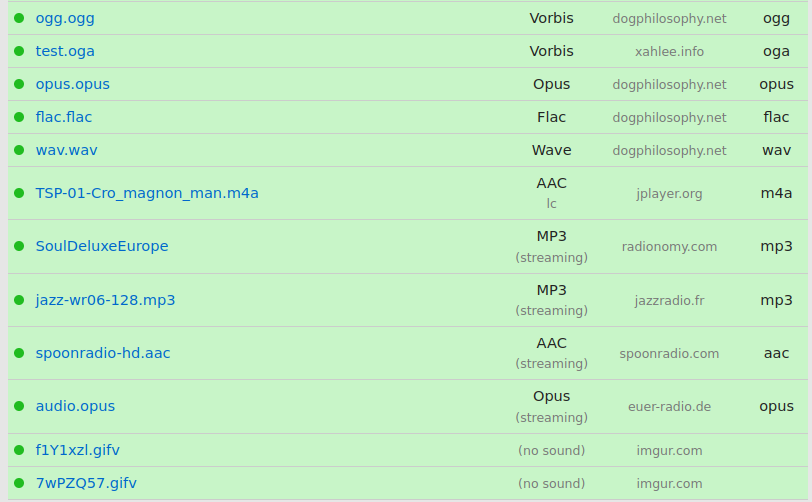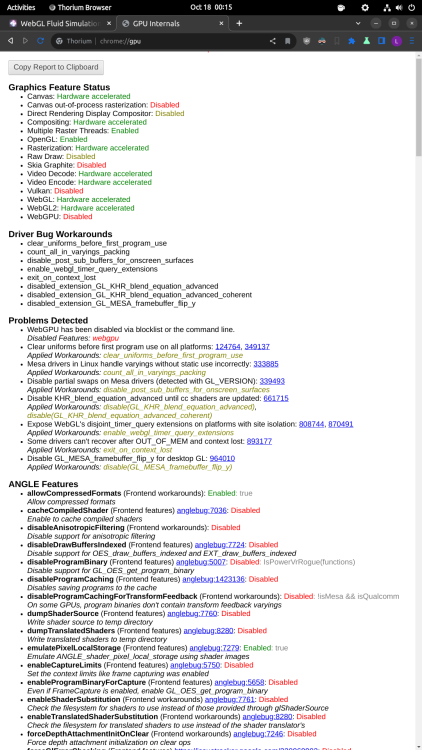Search the Community
Showing results for 'video acceleration within browser'.
-
IT'S FINALLY HERE... THE OFFICIAL ROCKCHIP-LEGACY MULTIMEDIA INTEGRATION After two years of using a separate script to enable the multimedia features in RK3399 Legacy Kernel, the whole framework has been incorporated to the official Armbian packaging system. The choice distro for this integration is Debian Buster (see FAQ at the end of this post about the reasons). I. Installation Download a Armbian Buster Legacy Desktop image for your board, and install it with the standard Armbian method. Install the complete multimedia solution with sudo apt update && sudo apt upgrade sudo apt install media-buster-legacy-rk3399 --install-recommends The switch "--install-recommends" will add the whole Kodi binary addons collection (retro-gaming cores, music visualizations, screensavers, additional media decoders/encoders, vfs, etc.), plus the GLES-to-OpenGL wrapper "gl4es". II. Features Accelerated GLES/EGL X desktop: No action needed. Accelerated Chromium, with WebGL and video display acceleration: No action needed Desktop video player capable of smooth 4K HEVC-HDR: Use the "Rockchip Gst Player" from the Multimedia menu, or choose it with right-click on the media file. Command-line 4K playing is also possible with "gst-play-1.0 --videosink=kmssink". RKMPP-accelerated MPV: Use normally for standard operation (windowed with mouse-operated GUI). For fullscreen, keyboard-operated mode, use the command line switch "--gpu-context=drm" (this will allow you to play smooth 4K). - See instructions below, in the next post, for playing YouTube videos up to 4K with this MPV. ISP Camera with real-time h.264/1080p HW encoding: Using the Gstreamer Plugin. Check this wiki for instructions on how to use it. Most of it applies to Armbian, except for the selection of ov5647/imx219 camera, which must be done using DT overlays. OpenCL 1.2 support: It will be fully functional, no further action needed. You can download some tests and examples from this link. Kodi 18.9 Leia with full RKMPP+GBM acceleration, 4K-HDR capable: You can start it from LightDM menu as your user account: Alternatively, you can also run it as a system service with these command lines: sudo systemctl disable lightdm sudo systemctl enable kodi-gbm sudo reboot Full collection of Kodi binary add-ons: Includes retrogaming cores, media encoders and decoders, PVR, screensavers, vfs and audio visualizations. They are all installed with the package "kodi-addons-full", but are disabled by default. They need to be enabled individually within the Kodi GUI. OpenGL 2.1 support through the gl4es wrapper: It is installed with the package "gl4es", with no further action needed. III. Sources This is the list of the sources used for the packages: IV. FAQ ¿Why did you use Debian Buster as a base for this implementation? It was the most appropriate for several reasons. Upstream Rockchip-Linux developers use Debian buster, so the software could be ported with less modifications than if we chose a different distro. Besides, it is a completely stable distro, unlike Bullseye, which is a moving target as of today. It also has Chromium as a package, unlike Focal that uses snap instead. For last, it has a good backports repo, with several libs that would otherwise need to be compiled and maintained if we chose, for example, Focal. ¿Why Legacy instead of Mainline? This is an implementation based on the vendor's BSP kernel. It has been tested and is reliable, which many people will prefer rather than having a bleeding-edge, less stable implementation. In addition to that, Mainline upstream multimedia support is still a WIP, and lacks many features that are only present on Legacy kernels. ¿Will you add new features to this implementation? No, this implementation will only receive bug fixes if necessary. From now on, all multimedia work will be focused on Mainline and recent distros (like Focal or Bullseye). All new features will go there.
- 251 replies
-
11
-
- Orange Pi 4
- ROCKPro64
-
(and 1 more)
Tagged with:
-
Hi all. Here my review of the Orange Pi 5 Plus with Armbian Jammy. I show tips for better desktop experience, show how to build your own images, how to run games, and tons of info about the board. Here's the video : For those who rather read, here's my gathered data : https://docs.lane-fu.com/s/5IxGlf4gn Greetings, NicoD
-
!! DEPRECATED !! Instructions in this thread are oudated and superseded by the new experimental APT repository for hardware video decoding ffmpeg. Please refer to this thread from now on! Hello, recent upgrades to armbian are regarding kernel 5.15. I noticed that many v4l2 fixes and enhancements went into this release, so I decided to compile ffmpeg using LibreELEC patched version and mpv over it. mpv turns out to be statically linked with ffmpeg, so I propose it here for people who is interested in cutting edge kernel and wants to do some tests. This has been tested on Debian Bullseye and Ubuntu Hirsute on following platforms: Rockchip RK3228/9 (kernel 5.10, 5.14) Rockchip RK3288 (kernel 5.14) Rockchip RK3318/28 (kernel 5.15) It should work on allwinner platforms too, but I didn't test it there. Binaries are built by me on developing boards. The binary for armhf is available here The binary for arm64 is available here Copy the binary into /usr/local/bin directory of your system (mpv-armhf for 32 bit systems, mpv-arm64 for 64 bit systems): sudo cp mpv-armhf /usr/local/bin/mpv Install dependencies for Debian Bullseye and Ubuntu Hirsute: apt install libass9 libbluray2 librubberband2 libsdl2-2.0-0 libva-drm2 libva-wayland2 libva-x11-2 libva2 libvdpau1 libx264-160 libx265-192 libxss1 libxv1 libfdk-aac2 I have had issues with dependencies on Debian Buster/Ubuntu Focal, in particular libx264-160 and libx265-192 are not available there. I Solved the issue downloading the packages from Debian Bullseye web page and manually installing them. There may be the need for some other dependency depending upon your actual installation. Run mpv in a virtual terminal (videos up to 4K) with this CLI: mpv --vo=gpu --hwdec=drm --gpu-hwdec-interop=drmprime-drm --drm-draw-plane=overlay --drm-drmprime-video-plane=primary <video.mp4> Mpv can be run in X11 with this other CLI, but due to buffer copying it requires a good CPU - rk3228 and rk3328 won't even play 720p, rk3288 do 720p fine: mpv --vo=gpu --hwdec=auto-copy --gpu-context=x11egl --gpu-hwdec-interop=drmprime-drm <video.mp4> This is an experiment and your mileage may vary a lot: H.264 codec should be well supported around the boards; H.265 has more limited support VP8 should be generally supported VP9 seems to still require some work.
-

Is it possible to play videos with Kodi on Orange Pi 3 LTS ?
gop3k posted a topic in Allwinner sunxi
Hello, sorry for the dumb questions incoming, thanks for your time. Lately I spent a lot of time searching for a working image to run Kodi with wifi/ethernet/bluetooh on this board. Does anybody managed to play videos on Kodi on this SBC ? If yes, what armbian image should I choose for this purpose ? Do I have to build the image myself ? Tested LibreElec for this but no wifi because the drivers are out-of-the-tree, not in mainline Kernel. Read about my problem in many posts but didn't find what I was searching for... Not even sure if this SBC can be used as a linux media player. Any tip/link/guide/wiki on how to successfully install kodi/hardware acceleration/video decoding/needed drivers for this board will be much appreciated. -
Bionic, Focal, jammy Noble are all Ubuntu. Buster, Bullseye, bookworm, sid are all Debian versions. You use what you prefer or what fits your tasks best. I use Armbian Jammy on my Rock5B since I use it as main desktop and that's the image that works best for that. On my travel NanoPi R6S I use Armbian Noble because it has a better KDEnlive version to edit and render video's on my cycling trips. On my NAS ZimaBoard I use Noble because it fixes an issue with mounted drives, but could just as well use a debian version. For your tasks I would probably use Armbian Bookworm and install the apps. You probably could use CasaOS on Jammy for these tasks. It is a webinterface that allows you to install and setup docker apps. To install casaOS on Jammy : wget -qO- https://get.casaos.io | sudo bash So both downloadable images are community releases and not official armbian supported images. There is bookworm Debian 12 minimal which has only the essential things to boot a system and set it up. The other is Jammy Ubuntu 22.04 with the Gnome desktop. I would advice to build your own images with the distro version you want.
-
I'd like to congratulate you for a great release (24.2.1) with KDE! I was looking for a guide to install KDE in a minimum version, but I could not trim it down enough, and this release solved my issues. Everything is working smoothly, video acceleration is there, Wi-Fi (AX210) is there, bluetooth is there! A real pleasure to use. Best, team!
-
I have IQAir AirVision pro and i'm try to reverse engineer it it uses uboot sunxi (allwinner) was following this video according to video i need to know where flash chip is mapped in to memory then use md print whole firmware then used https://github.com/nmatt0/firmwaretools/blob/master/parse-uboot-dump.py to convert to firmware as he used bdinfo to get address (which is not present), what i do? Is there any way through which i can extract frimware from device? (like using FEL Mode) also found https://github.com/zador-blood-stained/h3-fel-mass-storage is it possible do same on Allwinner A33 logs https://xdaforums.com/attachments/boot-txt.6083991/ https://xdaforums.com/attachments/depthcharge-print_all-txt.6084119/ https://xdaforums.com/attachments/uboot_sunxi_printenv-txt.6083992/ https://xdaforums.com/attachments/uboot_more-info-txt.6084356/
-
So I was messing around with my new OrangePi-5+ and installed the EDK2 UEFI firmware for Rockchip RK3588 platforms onto the SPI flash (/dev/mtdblock0). After which I tried all sorts of images and kernels with varying success, only the 5.10.160-legacy-rk3588 kernel would really have a working display. Until I tried a generic UEFI arm64 image (Jammy-CLI on a USB stick) which gave a working display, albeit at 1080p max. (my monitor is 4K) with no acceleration (after the extra steps), and installed the Mate desktop (just my preference). The big caveat is that it does not recognize the SD-card, EMMC or SPI-flash, just regular drives (e.g. sda/nvme0n1 etc) and I'm sure a lot of other hardware isn't properly recognized either. But all of that was fixed by simply installing the old legacy kernel with apt, making a symbolic link to the correct dtb in /boot and updating grub, and a reboot later everything worked fine, the desktop popped up in 4K with acceleration and all. In the end I installed the whole thing to an NVME with armbian-config, which didn't create the separate EFI partition, so I had to corrected it manually, but that is another story. What surprises me is that the UEFI-arm64 kernel does not seem to need a Device-Tree-Blob, in fact it doesn't even boot with its own rk3588-orangepi-5-plus.dtb. Anyway if anyone want's to try this I'd suggest using Balena etcher to write the ED2K firmware onto an SD-card, and a generic UEFI armbian to an USB stick so you won't have to mess up anything permanently. Plug the stick in a USB2 port as it chokes during boot on the USB3 (blue) ports. And you will need a lot of patience as booting from a USB2 stick will be rather slow to say the least. Install legacy kernel: sudo apt update sudo apt install linux-image-legacy-rk35xx Create the symbolic link: (If you try this on another board or with another kernel version, you will need to adjust the link for the appropriate DTB instead) sudo ln -s /usr/lib/linux-image-5.10.160-legacy-rk35xx/rockchip/rk3588-orangepi-5-plus.dtb /boot/dtb-5.10.160-legacy-rk35xx Bonus tip, set the legacy kernel as a GRUB's default: (optional, adjust for different kernels) sudo echo 'GRUB_DEFAULT="Armbian GNU/Linux, with Linux 5.10.160-legacy-rk35xx"' > /etc/default/grub.d/99-legacy.cfg GRUB should now automatically pick up on the DTB after updating: sudo update-grub So far the only downside I have found is that the audio outputs are all labeled "Built-in Audio Stereo", which was easy to solve by adding some udev-rules as the Armbian build system does when building a regular OrangePi-5+ image.
-
Hi everyone! I have recently bought an Orange Pi 5 Plus (16 GB RAM) and installed Armbian (the Pi Plus version). Then I enabled GPU hardware acceleration, as suggested on the Armbian download page, which then updated chromium and other things to the rkmpp versions. Now, if I start chromium under Wayland (tried Sway, Gnome, and KDE), the hardware acceleration works nicely, so I get good FPS on e.g. WebGL aquarium, and similar things. However, the antialiasing of some items on the screen does not seem to be working. Antialiasing in WebGL seems off as well. You can see an example in the attached screenshot. Here's what I have tried so far: Before installing GPU acceleration packages from PPAs: antialiasing is good, video + WebGL very slow After installing, antialiasing is not working for some items, but video and WebGL performance is good. Terminal output from chromium: orangepi5-plus:~:% chromium-browser [6045:6045:1014/205303.066564:ERROR:gl_display.cc(520)] EGL Driver message (Error) eglQueryDeviceAttribEXT: eglQueryDeviceAttribEXT [6045:6045:1014/205303.066882:ERROR:gl_angle_util_vulkan.cc(189)] Failed to retrieve vkGetInstanceProcAddr [6045:6045:1014/205303.067071:ERROR:vulkan_instance.cc(91)] Failed to get vkGetInstanceProcAddr pointer from ANGLE. [6001:6001:1014/205306.049251:ERROR:chrome_browser_cloud_management_controller.cc(162)] Cloud management controller initialization aborted as CBCM is not enabled. Failed to query video capabilities: Inappropriate ioctl for device libv4l2: error getting capabilities: Inappropriate ioctl for device Failed to query video capabilities: Inappropriate ioctl for device libv4l2: error getting capabilities: Inappropriate ioctl for device [6045:6045:1014/205314.614093:ERROR:gl_surface_presentation_helper.cc(260)] GetVSyncParametersIfAvailable() failed for 1 times! [6045:6045:1014/205332.225266:ERROR:gl_surface_presentation_helper.cc(260)] GetVSyncParametersIfAvailable() failed for 2 times! [6045:6045:1014/205332.914513:ERROR:gl_surface_presentation_helper.cc(260)] GetVSyncParametersIfAvailable() failed for 3 times! When running Chromium with malirun (I understand that this makes it use blob drivers for Mali), the antialiasing is working again, but attempting to open chrome://gpu leads to a temporary freeze and the following console output. In addition, the keyboard and general interaction with the browser seems laggy, despite good WebGL performance: orangepi5-plus:~:% malirun chromium-browser [3461:3461:1014/211639.485891:ERROR:chrome_browser_cloud_management_controller.cc(162)] Cloud management controller initialization aborted as CBCM is not enabled. arm_release_ver: g13p0-01eac0, rk_so_ver: 3 [3507:3507:1014/211639.630264:ERROR:gl_angle_util_vulkan.cc(22)] EGL_EXT_device_query not supported [3507:3507:1014/211639.630525:ERROR:vulkan_instance.cc(91)] Failed to get vkGetInstanceProcAddr pointer from ANGLE. Failed to query video capabilities: Inappropriate ioctl for device libv4l2: error getting capabilities: Inappropriate ioctl for device Failed to query video capabilities: Inappropriate ioctl for device libv4l2: error getting capabilities: Inappropriate ioctl for device [3461:3492:1014/211640.511695:ERROR:object_proxy.cc(590)] Failed to call method: org.freedesktop.DBus.StartServiceByName: object_path= /org/freedesktop/DBus: org.freedesktop.DBus.Error.NoReply: Did not receive a reply. Possible causes include: the remote application did not send a reply, the message bus security policy blocked the reply, the reply timeout expired, or the network connection was broken. Warning: vkCreateInstance: Found no drivers! Error: vkCreateInstance failed with VK_ERROR_INCOMPATIBLE_DRIVER at CheckVkSuccessImpl (../../third_party/dawn/src/dawn/native/vulkan/VulkanError.cpp:88) at CreateVkInstance (../../third_party/dawn/src/dawn/native/vulkan/BackendVk.cpp:416) at Initialize (../../third_party/dawn/src/dawn/native/vulkan/BackendVk.cpp:302) at Create (../../third_party/dawn/src/dawn/native/vulkan/BackendVk.cpp:232) at operator() (../../third_party/dawn/src/dawn/native/vulkan/BackendVk.cpp:492) LIBGL: Initialising gl4es LIBGL: v1.1.5 built on Apr 18 2023 02:39:01 LIBGL: Using GLES 2.0 backend LIBGL: loaded: libGLESv2.so LIBGL: loaded: libEGL.so LIBGL: Using GLES 2.0 backend [1014/211839.760567:WARNING:exception_snapshot_linux.cc(263)] fpsimd not found [3461:3461:1014/211839.874801:ERROR:gpu_process_host.cc(953)] GPU process exited unexpectedly: exit_code=512 arm_release_ver: g13p0-01eac0, rk_so_ver: 3 Since I would like to use the OPi5 Plus for some browsing and related things, is there something that I can do to make antialiasing work? Thanks a lot in advance!
-

About making really hardware accelleration working with videos with aegisub
SoSie replied to SoSie's topic in Banana Pi M5
I tried with recommanded lxc (linux container is more secure) but opengl Mai is not recognized ----> so instead of sudo mkdir -p /srv/chroot/armbian sudo debootstrap --arch arm64 --foreign bookworm /srv/chroot/debian-arm64 http://debian.xtdv.net/debian sudo schroot -c debian-arm64 (step to create user pi skipped) apt install aegisub inxi We notice EVERYTHING IS RECOGNIZED: (debian-arm64)root@bananapim5:/home/pi# inxi -Gs Graphics: Device-1: meson-g12a-vpu driver: meson_drm v: N/A Device-2: meson-g12a-mali driver: panfrost v: kernel Device-3: meson-g12a-dw-hdmi driver: meson_dw_hdmi v: N/A Display: server: X.Org v: 1.21.1.4 driver: dri: meson gpu: meson_drm,panfrost,meson_dw_hdmi note: X driver n/a resolution: 1920x1080~60Hz API: OpenGL v: 3.1 Mesa 22.3.6 renderer: Mali-G31 (Panfrost) Sensors: System Temperatures: cpu: 44.3 C mobo: N/A Fan Speeds (RPM): N/A ++++++> I have done sudo lxc-create --name "arm64-bookworm" --template download -- --dist debian --release bookworm --arch arm64 sudo lxc-start -n "arm64-bookworm" sudo lxc-attach -n "arm64-bookworm" apt install aegisub inxi We notice GL is not FULLY DETECTED root@arm64-bookworm:/home/pi# inxi -Gs Graphics: Device-1: meson-g12a-vpu driver: meson_drm v: N/A Device-2: meson-g12a-mali driver: panfrost v: kernel Device-3: meson-g12a-dw-hdmi driver: meson_dw_hdmi v: N/A Display: server: X.org v: 1.21.1.7 driver: X: loaded: fbdev,modesetting gpu: mroot@arm64-bookworm:/home/pi# inxi -Gs Graphics: Device-1: meson-g12a-vpu driver: meson_drm v: N/A Device-2: meson-g12a-mali driver: panfrost v: kernel Device-3: meson-g12a-dw-hdmi driver: meson_dw_hdmi v: N/A Display: server: X.org v: 1.21.1.7 driver: X: loaded: fbdev,modesetting gpu: meson_drm,panfrost,meson_dw_hdmi resolution: 1920x1080 API: OpenGL Message: GL data unavailable for root. eson_drm,panfrost,meson_dw_hdmi resolution: 1920x1080 API: OpenGL Message: GL data unavailable for root. root@arm64-bookworm:/home/pi# lshw -c video *-graphics product: mesondrmfb physical id: 5 logical name: /dev/fb0 capabilities: fb configuration: depth=32 resolution=720,480 root@arm64-bookworm:/home/pi# xrandr --listproviders Can't open display :0 The reason is OpenGL rely on Xorg and Xorg can't find my display event after doing export DISPLAY=:0 the device :dev/fb0 does not exist also.as we can seet it withe the Xorg log: root@arm64-bookworm:/home/pi# cat /var/log/Xorg.0.log [ 25980.096] X.Org X Server 1.21.1.7 X Protocol Version 11, Revision 0 [ 25980.096] Current Operating System: Linux arm64-bookworm 6.2.0-rc3-meson64 #23.02.2 SMP PREEMPT Fri Feb 17 23:06:22 UTC 2023 aarch64 [ 25980.096] Kernel command line: root=UUID=4cc9d1be-c592-4e80-8f1c-e73b8c044930 rootwait rootfstype=ext4 splash plymouth.ignore-serial-consoles console=ttyAML0,115200 console=tty1 consoleblank=0 coherent_pool=2M loglevel=1 ubootpart=7ac72bfa-01 libata.force=noncq usb-storage.quirks=0x2537:0x1066:u,0x2537:0x1068:u,0x1058:0x1001:u video=drm_kms_helper.edid_firmware=HDMI-A-1:edid/720x480.bin video=HDMI-A-1:720x480M@60 fbcon=rotate:0 module_blacklist=simpledrm cgroup_enable=memory swapaccount=1 [ 25980.096] xorg-server 2:21.1.7-3+deb12u5 (https://www.debian.org/support) [ 25980.096] Current version of pixman: 0.42.2 [ 25980.097] Before reporting problems, check http://wiki.x.org to make sure that you have the latest version. [ 25980.097] Markers: (--) probed, (**) from config file, (==) default setting, (++) from command line, (!!) notice, (II) informational, (WW) warning, (EE) error, (NI) not implemented, (??) unknown. [ 25980.097] (==) Log file: "/var/log/Xorg.0.log", Time: Sun Mar 17 20:03:34 2024 [ 25980.098] (==) Using config directory: "/etc/X11/xorg.conf.d" [ 25980.098] (==) Using system config directory "/usr/share/X11/xorg.conf.d" [ 25980.100] (==) ServerLayout "dummy_layout" [ 25980.100] (**) |-->Screen "dummy_screen" (0) [ 25980.100] (**) | |-->Monitor "dummy_monitor" [ 25980.101] (**) | |-->Device "dummy_videocard" [ 25980.101] (**) |-->Input Device "dummy_mouse" [ 25980.101] (**) |-->Input Device "dummy_keyboard" [ 25980.101] (==) Automatically adding devices [ 25980.101] (==) Automatically enabling devices [ 25980.101] (==) Automatically adding GPU devices [ 25980.101] (==) Automatically binding GPU devices [ 25980.101] (==) Max clients allowed: 256, resource mask: 0x1fffff [ 25980.101] (WW) The directory "/usr/share/fonts/X11/cyrillic" does not exist. [ 25980.101] Entry deleted from font path. [ 25980.101] (==) FontPath set to: /usr/share/fonts/X11/misc, /usr/share/fonts/X11/100dpi/:unscaled, /usr/share/fonts/X11/75dpi/:unscaled, /usr/share/fonts/X11/Type1, /usr/share/fonts/X11/100dpi, /usr/share/fonts/X11/75dpi, built-ins [ 25980.101] (==) ModulePath set to "/usr/lib/xorg/modules" [ 25980.101] (II) Loader magic: 0xaaaac1da0f00 [ 25980.101] (II) Module ABI versions: [ 25980.101] X.Org ANSI C Emulation: 0.4 [ 25980.101] X.Org Video Driver: 25.2 [ 25980.101] X.Org XInput driver : 24.4 [ 25980.101] X.Org Server Extension : 10.0 [ 25980.105] (EE) systemd-logind: failed to get session: PID 991 does not belong to any known session [ 25980.109] (II) xfree86: Adding drm device (/dev/dri/card0) [ 25980.109] (II) Platform probe for /sys/devices/platform/soc/ff900000.vpu/drm/card0 [ 25980.111] (II) xfree86: Adding drm device (/dev/dri/card1) [ 25980.111] (II) Platform probe for /sys/devices/platform/soc/ffe40000.gpu/drm/card1 [ 25980.111] (II) no primary bus or device found [ 25980.111] (II) LoadModule: "glx" [ 25980.112] (II) Loading /usr/lib/xorg/modules/extensions/libglx.so [ 25980.115] (II) Module glx: vendor="X.Org Foundation" [ 25980.116] compiled for 1.21.1.7, module version = 1.0.0 [ 25980.116] ABI class: X.Org Server Extension, version 10.0 [ 25980.116] (==) Matched modesetting as autoconfigured driver 0 [ 25980.116] (==) Matched fbdev as autoconfigured driver 1 [ 25980.116] (==) Assigned the driver to the xf86ConfigLayout [ 25980.116] (II) LoadModule: "modesetting" [ 25980.116] (II) Loading /usr/lib/xorg/modules/drivers/modesetting_drv.so [ 25980.117] (II) Module modesetting: vendor="X.Org Foundation" [ 25980.117] compiled for 1.21.1.7, module version = 1.21.1 [ 25980.117] Module class: X.Org Video Driver [ 25980.117] ABI class: X.Org Video Driver, version 25.2 [ 25980.117] (II) LoadModule: "fbdev" [ 25980.117] (II) Loading /usr/lib/xorg/modules/drivers/fbdev_drv.so [ 25980.117] (II) Module fbdev: vendor="X.Org Foundation" [ 25980.118] compiled for 1.21.1.3, module version = 0.5.0 [ 25980.118] Module class: X.Org Video Driver [ 25980.118] ABI class: X.Org Video Driver, version 25.2 [ 25980.118] (II) LoadModule: "void" [ 25980.118] (WW) Warning, couldn't open module void [ 25980.118] (EE) Failed to load module "void" (module does not exist, 0) [ 25980.118] (II) modesetting: Driver for Modesetting Kernel Drivers: kms [ 25980.118] (II) FBDEV: driver for framebuffer: fbdev [ 25980.119] (WW) Falling back to old probe method for modesetting [ 25980.119] (EE) open /dev/dri/card0: No such file or directory [ 25980.119] (WW) Falling back to old probe method for fbdev [ 25980.119] (II) Loading sub module "fbdevhw" [ 25980.119] (II) LoadModule: "fbdevhw" [ 25980.119] (II) Loading /usr/lib/xorg/modules/libfbdevhw.so [ 25980.119] (II) Module fbdevhw: vendor="X.Org Foundation" [ 25980.119] compiled for 1.21.1.7, module version = 0.0.2 [ 25980.119] ABI class: X.Org Video Driver, version 25.2 [ 25980.120] (EE) open /dev/fb0: No such file or directory [ 25980.120] (WW) Falling back to old probe method for modesetting [ 25980.120] (EE) open /dev/dri/card0: No such file or directory [ 25980.120] (WW) Falling back to old probe method for fbdev [ 25980.120] (II) Loading sub module "fbdevhw" [ 25980.120] (II) LoadModule: "fbdevhw" [ 25980.120] (II) Loading /usr/lib/xorg/modules/libfbdevhw.so [ 25980.120] (II) Module fbdevhw: vendor="X.Org Foundation" [ 25980.120] compiled for 1.21.1.7, module version = 0.0.2 [ 25980.120] ABI class: X.Org Video Driver, version 25.2 [ 25980.120] (EE) open /dev/fb0: No such file or directory [ 25980.120] (EE) No devices detected. [ 25980.120] (EE) Fatal server error: [ 25980.120] (EE) no screens found(EE) [ 25980.120] (EE) Please consult the The X.Org Foundation support at http://wiki.x.org for help. [ 25980.121] (EE) Please also check the log file at "/var/log/Xorg.0.log" for additional information. [ 25980.121] (EE) [ 25980.121] (EE) Server terminated with error (1). Closing log file. Thus starting aegisub in linux container is impossible. root@arm64-bookworm:/home/pi# su - pi pi@arm64-bookworm:~$ aegisub-3.2 12:56:43: Error: Unable to initialize GTK+, is DISPLAY set properly? So now the question is DOES SOMEONE KNOW HOW TO MAKE LINUX CONTAINER WORK GRAPHICALLY UNDER Ubuntu JAMMY? -
TV Box Name MXQ MBX Model M201 CPU (example: amlogic s805 Meson 8B 4 cores 1.5 Ghz Armbian build file name:Armbian_5.67_Aml-s805_Ubuntu_bionic_default_3.10.108_desktop_20181207 DTB file used: Kernel Version:3.10.108 #14 SMP preenpt Distribution Installed (focal, buster, etc):Bionic Working Ethernet not tested Max Ethernet Speed that works (100/1000): Does wifi work Yes sort of, makes breaks connection continually, it will download updates Does bluetooth work (Yes/No):NA I don't know if the box has it Does HDMI audio work (Yes/No):Not tested Additional Comments (provide any additional information you feel is important): Headphone audio works although it is not perfect. Keyboard and mouse work fine, I have no remote to test Sound:AML8AUDIO Video playback is slow, I'm not sure if accelerated video is working Video:Mali-450 MP Booted fine, and updated fine 815 available memory
-
This issue might be caused by DRAM frequency scaling, which changes RAM frequency at runtime based on usage. Mainline Linux supports DRAM frequency scaling on RK3399 via the `CONFIG_ARM_RK3399_DMC_DEVFREQ` kernel config, but mainline is missing a patch that prevents the frequency from changing while a frame is being scanned out. That patch is needed because changes during scanout can cause glitches like the ones you describe in the RK3399's Video Output Processor (VOP). To check if that's the issue, you can try forcing the RAM frequency to the maximum by running the following: echo 'performance' | sudo tee /sys/class/devfreq/memory-controller/governor That'll result in higher power usage, but it should eliminate the glitches until you next reboot, as the RAM frequency won't change anymore.
-
I searched & tried all materials I can find, trying to set up FFmpeg to work with hardware acceleration on Orange Pi 5. But it did NOT work. Anyone else succeeds in using GPU hardware acceleration to encode/transcode video on Orange Pi 5 using FFmpeg? (or using gstreamer?) Could you please share with me the way to do it? Thank you very much indeed!
-

CSC Armbian for RK3318/RK3328 TV box boards
Ben N Voutour replied to jock's topic in Rockchip CPU Boxes
i'm running "Linux rk3318-box 6.7.4-edge-rockchip64 #1 SMP PREEMPT Mon Feb 5 20:17:12 UTC 2024 aarch64 aarch64 aarch64 GNU/Linux" (Ubuntu Noble ARM64) (That was from "uname -a [as root]") mine is at 800 MHz and no brick so far. i'm using microsd card (256GB) (Legit) and it runs pretty nice except for the non flathub version of kodi (it hangs with no errors) XFCE 4 desktop is normal fwiw and i'm experimenting with other desktop environments and window managers and compositing but hardware video acceleration does not work (Software Render only?) P.S. (I'm Not Crying, You're Crying.) #RK3318 #RockChip #Armbian #beta -
This is a HTML5 audio/video tester for web browsers: https://tools.woolyss.com/html5-audio-video-tester/ As you can see .webm is not enabled because frankly I have no idea which package I need to enable that. I have opus and av1 installed: ii libdav1d5:arm64 0.9.2-1 arm64 fast and small AV1 video stream decoder (shared library) ii libopus0:arm64 1.3.1-0.1build2 arm64 Opus codec runtime library I tried gstreamer1.0-ugly and gstreamer1.0-bad but to no avail. Any idea's which package I am missing?
-
Hi. I am using Khadas Edge 2 Rockchip RK3588S with Armbian Minimal version. I have installed xorg and firefox browser. After "startx" I rotated display (xrandr -o left) and run firefox. I don't know how is it calls, but I get a big gap when scrolling the website. In xrandr -o normal, it's gone. I will attach the video. Help me please. Thanks. IMG_0085.mp4
-
Armbian boot logo shows and also on shutdown.... just doesn't want to display the desktop. Gnome desktop image. 6.1.50-current-meson6 #2 SMP PREEMPT Wed Aug 30 14:11:13 UTC 2023 aarch64 aarch64 aarch64 GNU/Linux
-
@Jaisere the rootfs i gave to you clear says " utgard armsoc" DON'T UPGRADE DON'T DO NOTHING or you will loose the optimization made by linaro team the chromium browser itself uses a sort of hardware acceleration, the video uses a sort of gpu.. but DON'T EXPECT too much For nice graphical environmetn follow @jock 's suggestion, but will loose NAND
-
Armbian Jammy Gnome desktop and following those commands to enable 3D acceleration : then the mpv can not play any .avi files , Terminal output “segment error” . but .mp4 files can be played normally . and I tried running mpv using root or sudo to play .avi files , it can played normally . I am very troubled by this issue, please provide assistance.
-
I've been using Armbian for developing an image for running on some custom hardware based on an Allwinner S3 (SoC with a single arm v7 core and 128mb ram) and it has been really helpful. My system now runs the software it was built for, and i love having complete Debian for development, maintenance and debugging. However I would like to have the option of making the system more like an embedded system most of the time : for most of its life it's running a custom application that gets video from a camera, h264 encodes it and sends it and some other data out over a data link. When it's in this mode it would be great if it was more like a buildroot type system, ideally with a nice short boot time. However some of the time i want to keep the possibility of a user booting into full Linux as I'm running now. How would you go about this? at the moment I'm looking at creating a custom systemd target with as little as possible for embedded. Does that make sense?
-
Google has launched the new Chromecast with Google TV (HD) powered by an Amlogic S805X2 quad-core Cortex-A35 CPU that offers a cheaper alternative to the Chromecast with Google TV (4K) that is limited to 1080p60 resolution, instead of the 4Kp60 video output supported by the Amlogic S905X3 model. While the processor is slower, the system comes with less memory (1.5GB vs 2GB), and only supports 1080p60, it supports the more efficient AV1 video decoding and as well as A/B partitions for seamless updates since the firmware does not need to be downloaded to the internal storage before the Chromecast with Google TV (HD) specifications: SoC – Amlogic S805X2 quad-core Cortex-A35 processor with Mali-G31 MP2 GPU, 1080p60 H.265, H.264, VP9, AV1 video decoder System Memory – 1.5GB RAM Storage – 8GB eMMC flash with support for “virtual A/B updates with compression“ Video output – HDMI up to 1080p60 with HDR support [...] The post Chromecast with Google TV (HD) features Amlogic S805X2 CPU with AV1 video support appeared first on CNX Software - Embedded Systems News. View the full article
-
Just stumbled over another chromium fork: https://github.com/Alex313031/Thorium Forum search did not show any entries, so I thought I might share. The arm64 builds (for raspberry though) works great, it even has googly sync, widevine etc, check describtion for more info. It works out-of-the-box on legacy rock-5b jammy gnome images with liujianfeng1994 ppa enabled. For installation/updates one could also use: wget https://dl.thorium.rocks/debian/dists/stable/thorium.list sudo mv thorium.list /etc/apt/sources.list.d/ sudo apt update sudo apt install thorium-browser I usually like to test https://paveldogreat.github.io/WebGL-Fluid-Simulation/ which also runs smooth with webgl on the rock-5b. This might be a good choice, till upstream support makes it easier to find a up2date browser with gpu support.
-
Hi everyone, Has anyone been able to get gpu hardware acceleration to do encoding/decoding on Jellyfin on the orange pi 5? Thank you
-
When I run the Linux kernel on the Odroid XU4 board, it enters a loop with this error during boot: U-Boot 2017.05-00008-g6a9ddb8303-dirty (May 19 2020 - 19:48:01 +0900) for ODROID-XU4 CPU: Exynos5422 @ 800 MHz Model: Odroid XU4 based on EXYNOS5422 Board: Odroid XU4 based on EXYNOS5422 Type: xu4 DRAM: 2 GiB MMC: EXYNOS DWMMC: 0, EXYNOS DWMMC: 1 MMC Device 0 ( SD ): 29.7 GiB mmc_init: -5, time 4 *** Warning - bad CRC, using default environment In: serial Out: serial Err: serial Net: No ethernet found. Press quickly 'Enter' twice to stop autoboot: 0 reading /boot.ini 2401 bytes read in 4 ms (585.9 KiB/s) ## Executing script at 43e00000 reading config.ini 6911 bytes read in 5 ms (1.3 MiB/s) ini: Imported macaddr as 00:1e:06:61:7a:39 ini: Imported vout as hdmi ini: Imported HPD as true ini: Imported cecenable as false ini: Imported disable_vu7 as false ini: Imported ddr_freq as 825 ini: Imported overlay_resize as 16384 ini: Imported overlay_profile as ini: Imported overlays as spi0 i2c0 i2c1 uart0 No FDT memory address configured. Please configure the FDT address via "fdt addr <address>" command. Aborting! reading zImage 7299952 bytes read in 490 ms (14.2 MiB/s) reading exynos5422-odroidxu4.dtb 88559 bytes read in 11 ms (7.7 MiB/s) reading overlays/spi0.dtbo 691 bytes read in 5 ms (134.8 KiB/s) reading overlays/i2c0.dtbo 224 bytes read in 5 ms (43 KiB/s) reading overlays/i2c1.dtbo 226 bytes read in 5 ms (43.9 KiB/s) reading overlays/uart0.dtbo 227 bytes read in 6 ms (36.1 KiB/s) Kernel image @ 0x40008000 [ 0x000000 - 0x6f6370 ] ## Flattened Device Tree blob at 44000000 Booting using the fdt blob at 0x44000000 reserving fdt memory region: addr=44000000 size=2c000 Using Device Tree in place at 44000000, end 4402efff Starting kernel ... [ 0.000000] Booting Linux on physical CPU 0x100 [ 0.000000] Linux version 6.1.77+ (odroid@odroid) (gcc (Ubuntu 11.4.0-1ubuntu1~22.04) 11.4.0, GNU ld (GNU Binutils for Ubuntu) 2.38) #1 SMP PREEMPT Wed Mar 6 17:56:35 -03 2024 [ 0.000000] CPU: ARMv7 Processor [410fc073] revision 3 (ARMv7), cr=30c5387d [ 0.000000] CPU: div instructions available: patching division code [ 0.000000] CPU: PIPT / VIPT nonaliasing data cache, VIPT aliasing instruction cache [ 0.000000] OF: fdt: Machine model: Hardkernel ODROID XU4 [ 0.000000] Memory policy: Data cache writealloc [ 0.000000] cma: Reserved 128 MiB at 0x00000000b6800000 [ 0.000000] Samsung CPU ID: 0xe5422001 [ 0.000000] Zone ranges: [ 0.000000] Normal [mem 0x0000000040000000-0x000000006fffffff] [ 0.000000] HighMem [mem 0x0000000070000000-0x00000000be9fffff] [ 0.000000] Movable zone start for each node [ 0.000000] Early memory node ranges [ 0.000000] node 0: [mem 0x0000000040000000-0x00000000be9fffff] [ 0.000000] Initmem setup node 0 [mem 0x0000000040000000-0x00000000be9fffff] [ 0.000000] Running under secure firmware. [ 0.000000] percpu: Embedded 17 pages/cpu s39124 r8192 d22316 u69632 [ 0.000000] Built 1 zonelists, mobility grouping on. Total pages: 516928 [ 0.000000] Kernel command line: console=tty1 console=ttySAC2,115200n8 root=UUID=e139ce78-9841-40fe-8823-96a304a09859 rootwait ro fsck.repair=yes net.ifnames=0 HPD=true vout=hdmi e [ 0.000000] hdmi: using HDMI mode [ 0.000000] Unknown kernel command line parameters "false HPD=true vout=hdmi", will be passed to user space. [ 0.000000] Dentry cache hash table entries: 131072 (order: 7, 524288 bytes, linear) [ 0.000000] Inode-cache hash table entries: 65536 (order: 6, 262144 bytes, linear) [ 0.000000] mem auto-init: stack:off, heap alloc:off, heap free:off [ 0.000000] Memory: 1903668K/2074624K available (12288K kernel code, 1139K rwdata, 2940K rodata, 2048K init, 363K bss, 39884K reserved, 131072K cma-reserved, 1157120K highmem) [ 0.000000] SLUB: HWalign=64, Order=0-3, MinObjects=0, CPUs=8, Nodes=1 [ 0.000000] trace event string verifier disabled [ 0.000000] rcu: Preemptible hierarchical RCU implementation. [ 0.000000] Trampoline variant of Tasks RCU enabled. [ 0.000000] Tracing variant of Tasks RCU enabled. [ 0.000000] rcu: RCU calculated value of scheduler-enlistment delay is 10 jiffies. [ 0.000000] NR_IRQS: 16, nr_irqs: 16, preallocated irqs: 16 [ 0.000000] GIC: Using split EOI/Deactivate mode [ 0.000000] rcu: srcu_init: Setting srcu_struct sizes based on contention. [ 0.000000] Switching to timer-based delay loop, resolution 41ns [ 0.000000] clocksource: mct-frc: mask: 0xffffffff max_cycles: 0xffffffff, max_idle_ns: 79635851949 ns [ 0.000002] sched_clock: 32 bits at 24MHz, resolution 41ns, wraps every 89478484971ns [ 0.000032] genirq: irq_chip COMBINER did not update eff. affinity mask of irq 57 [ 0.001509] arch_timer: cp15 timer(s) running at 24.00MHz (phys). [ 0.001535] clocksource: arch_sys_counter: mask: 0xffffffffffffff max_cycles: 0x588fe9dc0, max_idle_ns: 440795202592 ns [ 0.001555] sched_clock: 56 bits at 24MHz, resolution 41ns, wraps every 4398046511097ns [ 0.001572] Ignoring duplicate/late registration of read_current_timer delay [ 0.002351] Console: colour dummy device 80x30 [ 0.003109] printk: console [tty1] enabled [ 0.003176] Calibrating delay loop (skipped), value calculated using timer frequency.. 48.00 BogoMIPS (lpj=240000) [ 0.003223] CPU: Testing write buffer coherency: ok [ 0.003313] pid_max: default: 32768 minimum: 301 [ 0.003464] LSM: Security Framework initializing [ 0.003658] Mount-cache hash table entries: 2048 (order: 1, 8192 bytes, linear) [ 0.003711] Mountpoint-cache hash table entries: 2048 (order: 1, 8192 bytes, linear) [ 0.005467] CPU0: thread -1, cpu 0, socket 1, mpidr 80000100 [ 0.006882] cblist_init_generic: Setting adjustable number of callback queues. [ 0.006928] cblist_init_generic: Setting shift to 3 and lim to 1. [ 0.007116] cblist_init_generic: Setting adjustable number of callback queues. [ 0.007151] cblist_init_generic: Setting shift to 3 and lim to 1. [ 0.007359] Setting up static identity map for 0x40200000 - 0x40200060 [ 0.007711] ARM CCI driver probed [ 0.008305] Exynos MCPM support installed [ 0.008707] rcu: Hierarchical SRCU implementation. [ 0.008734] rcu: Max phase no-delay instances is 1000. [ 0.010012] smp: Bringing up secondary CPUs ... [ 0.011171] CPU1: thread -1, cpu 1, socket 1, mpidr 80000101 [ 0.012478] CPU2: thread -1, cpu 2, socket 1, mpidr 80000102 [ 0.013707] CPU3: thread -1, cpu 3, socket 1, mpidr 80000103 [ 0.014902] CPU4: thread -1, cpu 0, socket 0, mpidr 80000000 [ 0.014919] CPU4: detected I-Cache line size mismatch, workaround enabled [ 0.014927] CPU4: Spectre v2: firmware did not set auxiliary control register IBE bit, system vulnerable [ 0.015018] CPU4: Spectre BHB: enabling loop workaround for all CPUs [ 0.016286] CPU5: thread -1, cpu 1, socket 0, mpidr 80000001 [ 0.016300] CPU5: detected I-Cache line size mismatch, workaround enabled [ 0.016307] CPU5: Spectre v2: firmware did not set auxiliary control register IBE bit, system vulnerable [ 0.017624] CPU6: thread -1, cpu 2, socket 0, mpidr 80000002 [ 0.017638] CPU6: detected I-Cache line size mismatch, workaround enabled [ 0.017645] CPU6: Spectre v2: firmware did not set auxiliary control register IBE bit, system vulnerable [ 0.018922] CPU7: thread -1, cpu 3, socket 0, mpidr 80000003 [ 0.018937] CPU7: detected I-Cache line size mismatch, workaround enabled [ 0.018945] CPU7: Spectre v2: firmware did not set auxiliary control register IBE bit, system vulnerable [ 0.019180] smp: Brought up 1 node, 8 CPUs [ 0.019244] SMP: Total of 8 processors activated (384.00 BogoMIPS). [ 0.019276] CPU: All CPU(s) started in HYP mode. [ 0.019297] CPU: Virtualization extensions available. [ 0.020752] devtmpfs: initialized [ 0.042523] VFP support v0.3: implementor 41 architecture 4 part 30 variant f rev 0 [ 0.042807] clocksource: jiffies: mask: 0xffffffff max_cycles: 0xffffffff, max_idle_ns: 19112604462750000 ns [ 0.042850] futex hash table entries: 2048 (order: 5, 131072 bytes, linear) [ 0.045974] pinctrl core: initialized pinctrl subsystem [ 0.048866] NET: Registered PF_NETLINK/PF_ROUTE protocol family [ 0.052562] DMA: preallocated 2048 KiB pool for atomic coherent allocations [ 0.054296] audit: initializing netlink subsys (disabled) [ 0.054571] audit: type=2000 audit(0.050:1): state=initialized audit_enabled=0 res=1 [ 0.055157] thermal_sys: Registered thermal governor 'step_wise' [ 0.055436] cpuidle: using governor menu [ 0.055910] hw-breakpoint: found 5 (+1 reserved) breakpoint and 4 watchpoint registers. [ 0.055941] hw-breakpoint: maximum watchpoint size is 8 bytes. [ 0.185987] EXYNOS5420 PMU initialized [ 0.292725] kprobes: kprobe jump-optimization is enabled. All kprobes are optimized if possible. [ 0.294707] fbcon: Taking over console [ 0.296476] iommu: Default domain type: Translated [ 0.296501] iommu: DMA domain TLB invalidation policy: lazy mode [ 0.296909] usbcore: registered new interface driver usbfs [ 0.296979] usbcore: registered new interface driver hub [ 0.297050] usbcore: registered new device driver usb [ 0.297807] s3c-i2c 12c70000.i2c: slave address 0x00 [ 0.297837] s3c-i2c 12c70000.i2c: bus frequency set to 378 KHz [ 0.298170] s3c-i2c 12c70000.i2c: i2c-0: S3C I2C adapter [ 0.298383] s3c-i2c 12c80000.i2c: slave address 0x00 [ 0.298412] s3c-i2c 12c80000.i2c: bus frequency set to 65 KHz [ 0.298719] s3c-i2c 12c80000.i2c: i2c-2: S3C I2C adapter [ 0.299209] mc: Linux media interface: v0.10 [ 0.299295] videodev: Linux video capture interface: v2.00 [ 0.299921] Advanced Linux Sound Architecture Driver Initialized. [ 0.301010] clocksource: Switched to clocksource mct-frc [ 0.301481] VFS: Disk quotas dquot_6.6.0 [ 0.301559] VFS: Dquot-cache hash table entries: 1024 (order 0, 4096 bytes) [ 0.315803] NET: Registered PF_INET protocol family [ 0.316073] IP idents hash table entries: 16384 (order: 5, 131072 bytes, linear) [ 0.317886] tcp_listen_portaddr_hash hash table entries: 512 (order: 0, 4096 bytes, linear) [ 0.317937] Table-perturb hash table entries: 65536 (order: 6, 262144 bytes, linear) [ 0.318036] TCP established hash table entries: 8192 (order: 3, 32768 bytes, linear) [ 0.318132] TCP bind hash table entries: 8192 (order: 5, 131072 bytes, linear) [ 0.318434] TCP: Hash tables configured (established 8192 bind 8192) [ 0.318557] UDP hash table entries: 512 (order: 2, 16384 bytes, linear) [ 0.318617] UDP-Lite hash table entries: 512 (order: 2, 16384 bytes, linear) [ 0.318871] NET: Registered PF_UNIX/PF_LOCAL protocol family [ 0.318931] NET: Registered PF_XDP protocol family [ 0.320817] hw perfevents: enabled with armv7_cortex_a7 PMU driver, 5 counters available [ 0.322010] hw perfevents: enabled with armv7_cortex_a15 PMU driver, 7 counters available [ 0.324097] Initialise system trusted keyrings [ 0.324437] workingset: timestamp_bits=14 max_order=19 bucket_order=5 [ 0.333908] romfs: ROMFS MTD (C) 2007 Red Hat, Inc. [ 0.421548] NET: Registered PF_ALG protocol family [ 0.421584] Key type asymmetric registered [ 0.421605] Asymmetric key parser 'x509' registered [ 0.421839] bounce: pool size: 64 pages [ 0.421992] Block layer SCSI generic (bsg) driver version 0.4 loaded (major 247) [ 0.422397] io scheduler mq-deadline registered [ 0.422425] io scheduler kyber registered [ 0.422681] io scheduler bfq registered [ 0.424520] samsung-pinctrl 13400000.pinctrl: Failed to create device link (0x180) with soc [ 0.426837] samsung-usb2-phy 12130000.phy: supply vbus not found, using dummy regulator [ 0.427839] exynos5_usb3drd_phy 12100000.phy: supply vbus not found, using dummy regulator [ 0.428032] exynos5_usb3drd_phy 12100000.phy: supply vbus-boost not found, using dummy regulator [ 0.428460] exynos5_usb3drd_phy 12500000.phy: supply vbus not found, using dummy regulator [ 0.428634] exynos5_usb3drd_phy 12500000.phy: supply vbus-boost not found, using dummy regulator [ 0.436864] dma-pl330 3880000.dma-controller: Loaded driver for PL330 DMAC-241330 [ 0.436898] dma-pl330 3880000.dma-controller: DBUFF-4x8bytes Num_Chans-6 Num_Peri-16 Num_Events-6 [ 0.439976] dma-pl330 121a0000.dma-controller: Loaded driver for PL330 DMAC-241330 [ 0.440008] dma-pl330 121a0000.dma-controller: DBUFF-32x4bytes Num_Chans-8 Num_Peri-32 Num_Events-32 [ 0.443083] dma-pl330 121b0000.dma-controller: Loaded driver for PL330 DMAC-241330 [ 0.443116] dma-pl330 121b0000.dma-controller: DBUFF-32x4bytes Num_Chans-8 Num_Peri-32 Num_Events-32 [ 0.444270] dma-pl330 10800000.dma-controller: Loaded driver for PL330 DMAC-241330 [ 0.444300] dma-pl330 10800000.dma-controller: DBUFF-64x8bytes Num_Chans-8 Num_Peri-1 Num_Events-32 [ 0.461998] dma-pl330 3880000.dma-controller: PM domain MAU will not be powered off [ 0.533568] Serial: 8250/16550 driver, 4 ports, IRQ sharing disabled [ 0.536218] 12c00000.serial: ttySAC0 at MMIO 0x12c00000 (irq = 124, base_baud = 0) is a S3C6400/10 [ 0.536771] 12c20000.serial: ttySAC2 at MMIO 0x12c20000 (irq = 125, base_baud = 0) is a S3C6400/10 [ 1.553526] printk: console [ttySAC2] enabled [ 1.560131] exynos-trng 10830600.rng: Exynos True Random Number Generator. [ 1.567245] exynos-mixer 14450000.mixer: Adding to iommu group 0 [ 1.574772] exynos-drm-g2d 10850000.g2d: Adding to iommu group 1 [ 1.581147] exynos-rotator 11c00000.rotator: Adding to iommu group 2 [ 1.587248] exynos-scaler 12800000.scaler: Adding to iommu group 3 [ 1.593888] exynos-scaler 12810000.scaler: Adding to iommu group 4 [ 1.600295] exynos-scaler 12820000.scaler: Adding to iommu group 5 [ 1.607009] exynos-drm-gsc 13e00000.video-scaler: Adding to iommu group 6 [ 1.613211] exynos-drm-gsc 13e00000.video-scaler: drm gsc registered successfully. [ 1.620298] exynos-drm-gsc 13e10000.video-scaler: Adding to iommu group 7 [ 1.627466] exynos-drm-gsc 13e10000.video-scaler: drm gsc registered successfully. [ 1.652020] brd: module loaded [ 1.654773] usbcore: registered new device driver r8152-cfgselector [ 1.659902] usbcore: registered new interface driver r8152 [ 1.665405] usbcore: registered new interface driver cdc_ether [ 1.671186] usbcore: registered new interface driver cdc_subset [ 1.677065] usbcore: registered new interface driver r8153_ecm [ 1.685749] phy phy-12130000.phy.6: phy_power_on was called before phy_init [ 1.691276] exynos-ehci 12110000.usb: EHCI Host Controller [ 1.696714] exynos-ehci 12110000.usb: new USB bus registered, assigned bus number 1 [ 1.704845] exynos-ehci 12110000.usb: irq 133, io mem 0x12110000 [ 1.731064] exynos-ehci 12110000.usb: USB 2.0 started, EHCI 1.00 [ 1.735818] usb usb1: New USB device found, idVendor=1d6b, idProduct=0002, bcdDevice= 6.01 [ 1.743876] usb usb1: New USB device strings: Mfr=3, Product=2, SerialNumber=1 [ 1.751068] usb usb1: Product: EHCI Host Controller [ 1.755880] usb usb1: Manufacturer: Linux 6.1.77+ ehci_hcd [ 1.761370] usb usb1: SerialNumber: 12110000.usb [ 1.766665] hub 1-0:1.0: USB hub found [ 1.769693] hub 1-0:1.0: 3 ports detected [ 1.774988] phy phy-12130000.phy.6: phy_power_on was called before phy_init [ 1.780583] exynos-ohci 12120000.usb: USB Host Controller [ 1.786000] exynos-ohci 12120000.usb: new USB bus registered, assigned bus number 2 [ 1.793806] exynos-ohci 12120000.usb: irq 133, io mem 0x12120000 [ 1.865293] usb usb2: New USB device found, idVendor=1d6b, idProduct=0001, bcdDevice= 6.01 [ 1.872132] usb usb2: New USB device strings: Mfr=3, Product=2, SerialNumber=1 [ 1.879280] usb usb2: Product: USB Host Controller [ 1.884074] usb usb2: Manufacturer: Linux 6.1.77+ ohci_hcd [ 1.889502] usb usb2: SerialNumber: 12120000.usb [ 1.894774] hub 2-0:1.0: USB hub found [ 1.897855] hub 2-0:1.0: 3 ports detected [ 1.904077] UDC core: dbgp: couldn't find an available UDC [ 1.908531] mousedev: PS/2 mouse device common for all mice [ 1.915382] i2c_dev: i2c /dev entries driver [ 1.943247] vdd_ldo9: Bringing 3300000uV into 3000000-3000000uV [ 1.960292] vddq_mmc2: Bringing 3300000uV into 2800000-2800000uV [ 1.979785] vdd_sd: Bringing 3300000uV into 2800000-2800000uV [ 2.049199] s5m-rtc s2mps14-rtc: registered as rtc0 [ 2.054487] s5m-rtc s2mps14-rtc: setting system clock to 2000-01-01T00:00:08 UTC (946684808) [ 2.061844] s2mps11-clk s2mps11-clk: DMA mask not set [ 2.076557] exynos-tmu 10060000.tmu: More trip points than supported by this TMU. [ 2.082622] exynos-tmu 10060000.tmu: 2 trip points should be configured in polling mode. [ 2.092426] exynos-tmu 10064000.tmu: More trip points than supported by this TMU. [ 2.098440] exynos-tmu 10064000.tmu: 2 trip points should be configured in polling mode. [ 2.108348] exynos-tmu 10068000.tmu: More trip points than supported by this TMU. [ 2.114407] exynos-tmu 10068000.tmu: 2 trip points should be configured in polling mode. [ 2.124320] exynos-tmu 1006c000.tmu: More trip points than supported by this TMU. [ 2.130338] exynos-tmu 1006c000.tmu: 2 trip points should be configured in polling mode. [ 2.140250] exynos-tmu 100a0000.tmu: More trip points than supported by this TMU. [ 2.146302] exynos-tmu 100a0000.tmu: 6 trip points should be configured in polling mode. [ 2.155544] s3c2410-wdt 101d0000.watchdog: watchdog inactive, reset disabled, irq disabled [ 2.163331] device-mapper: uevent: version 1.0.3 [ 2.167537] device-mapper: ioctl: 4.47.0-ioctl (2022-07-28) initialised: dm-devel@redhat.com [ 2.191451] sdhci: Secure Digital Host Controller Interface driver [ 2.196199] sdhci: Copyright(c) Pierre Ossman [ 2.201064] Synopsys Designware Multimedia Card Interface Driver [ 2.208067] dwmmc_exynos 12220000.mmc: IDMAC supports 32-bit address mode. [ 2.208115] dwmmc_exynos 12200000.mmc: IDMAC supports 32-bit address mode. [ 2.220477] dwmmc_exynos 12220000.mmc: Using internal DMA controller. [ 2.224492] s5p-secss 10830000.sss: s5p-sss driver registered [ 2.226796] dwmmc_exynos 12220000.mmc: Version ID is 250a [ 2.232750] dwmmc_exynos 12200000.mmc: Using internal DMA controller. [ 2.234102] hid: raw HID events driver (C) Jiri Kosina [ 2.238124] dwmmc_exynos 12220000.mmc: DW MMC controller at irq 144,64 bit host data width,64 deep fifo [ 2.244291] dwmmc_exynos 12200000.mmc: Version ID is 250a [ 2.264162] dwmmc_exynos 12200000.mmc: DW MMC controller at irq 145,64 bit host data width,64 deep fifo [ 2.268759] mmc_host mmc0: Bus speed (slot 0) = 50000000Hz (slot req 400000Hz, actual 396825HZ div = 63) [ 2.275936] dwmmc_exynos 12200000.mmc: allocated mmc-pwrseq [ 2.292675] exynos-nocp: new NoC Probe device registered: 10ca1000.nocp [ 2.297970] exynos-nocp: new NoC Probe device registered: 10ca1400.nocp [ 2.304571] exynos-nocp: new NoC Probe device registered: 10ca1800.nocp [ 2.305514] mmc_host mmc1: Bus speed (slot 0) = 50000000Hz (slot req 400000Hz, actual 396825HZ div = 63) [ 2.312086] exynos-nocp: new NoC Probe device registered: 10ca1c00.nocp [ 2.327451] exynos-ppmu: new PPMU device registered 10d00000.ppmu (ppmu-event3-dmc0-0) [ 2.335102] exynos-ppmu: new PPMU device registered 10d10000.ppmu (ppmu-event3-dmc0-1) [ 2.342974] exynos-ppmu: new PPMU device registered 10d60000.ppmu (ppmu-event3-dmc1-0) [ 2.350839] exynos-ppmu: new PPMU device registered 10d70000.ppmu (ppmu-event3-dmc1-1) [ 2.361081] exynos5-dmc 10c20000.memory-controller: error -ENXIO: IRQ drex_0 not found [ 2.367518] exynos5-dmc 10c20000.memory-controller: error -ENXIO: IRQ drex_1 not found [ 2.375591] exynos5-dmc 10c20000.memory-controller: DMC initialized, in irq mode: 0 [ 2.384755] mmc_host mmc0: Bus speed (slot 0) = 200000000Hz (slot req 200000000Hz, actual 200000000HZ div = 0) [ 2.394797] samsung-i2s 3830000.i2s-sec: DMA channels sourced from device 3830000.i2s [ 2.397011] mmc0: new ultra high speed SDR104 SDHC card at address aaaa [ 2.407340] NET: Registered PF_PACKET protocol family [ 2.409624] mmcblk0: mmc0:aaaa SE32G 29.7 GiB [ 2.412797] NET: Registered PF_KEY protocol family [ 2.422627] Key type dns_resolver registered [ 2.426187] mmcblk0: p1 p2 [ 2.426754] Registering SWP/SWPB emulation handler [ 2.434051] registered taskstats version 1 [ 2.437817] Loading compiled-in X.509 certificates [ 2.443116] Key type .fscrypt registered [ 2.446464] Key type fscrypt-provisioning registered [ 2.457336] Key type encrypted registered [ 2.588749] exynos-chipid 10000000.chipid: cpu0 opp0, freq: 1500 missing [ 2.594193] exynos-chipid 10000000.chipid: cpu4 opp0, freq: 2100 missing [ 2.600762] exynos-chipid 10000000.chipid: Exynos: CPU[EXYNOS5800] PRO_ID[0xe5422000] REV[0x1] Detected [ 2.617722] OF: graph: no port node found in /soc/hdmi@14530000 [ 2.624147] [drm] Exynos DRM: using 14450000.mixer device for DMA mapping operations [ 2.630520] exynos-drm exynos-drm: bound 14450000.mixer (ops 0xc0e7bc8c) [ 2.637165] exynos-drm exynos-drm: bound 14530000.hdmi (ops 0xc0e7c26c) [ 2.643884] exynos-drm-g2d 10850000.g2d: The Exynos G2D (ver 4.1) successfully registered. [ 2.651958] exynos-drm exynos-drm: bound 10850000.g2d (ops 0xc0e7d27c) [ 2.658441] exynos-rotator 11c00000.rotator: The exynos rotator has been probed successfully [ 2.666855] exynos-drm exynos-drm: bound 11c00000.rotator (ops 0xc0e7db08) [ 2.673723] exynos-scaler 12800000.scaler: The exynos scaler has been probed successfully [ 2.681842] exynos-drm exynos-drm: bound 12800000.scaler (ops 0xc0e7e250) [ 2.688607] exynos-scaler 12810000.scaler: The exynos scaler has been probed successfully [ 2.696755] exynos-drm exynos-drm: bound 12810000.scaler (ops 0xc0e7e250) [ 2.703526] exynos-scaler 12820000.scaler: The exynos scaler has been probed successfully [ 2.711662] exynos-drm exynos-drm: bound 12820000.scaler (ops 0xc0e7e250) [ 2.718396] exynos-drm-gsc 13e00000.video-scaler: The exynos gscaler has been probed successfully [ 2.727314] exynos-drm exynos-drm: bound 13e00000.video-scaler (ops 0xc0e7eb24) [ 2.734594] exynos-drm-gsc 13e10000.video-scaler: The exynos gscaler has been probed successfully [ 2.743425] exynos-drm exynos-drm: bound 13e10000.video-scaler (ops 0xc0e7eb24) [ 2.791131] mmc_host mmc1: Bus speed (slot 0) = 50000000Hz (slot req 300000Hz, actual 297619HZ div = 84) [ 2.838676] mmc_host mmc1: Bus speed (slot 0) = 50000000Hz (slot req 200000Hz, actual 200000HZ div = 125) [ 2.878753] mmc_host mmc1: Bus speed (slot 0) = 50000000Hz (slot req 100000Hz, actual 100000HZ div = 250) [ 2.907827] Console: switching to colour frame buffer device 180x56 [ 2.973325] exynos-drm exynos-drm: [drm] fb0: exynosdrmfb frame buffer device [ 2.984476] [drm] Initialized exynos 1.1.0 20180330 for exynos-drm on minor 0 [ 3.004351] mali 11800000.gpu: GPU identified as 0x0620 r0p1 status 0 [ 3.010719] mali 11800000.gpu: Protected mode not available [ 3.018316] mali 11800000.gpu: Probed as mali0 [ 3.026735] xhci-hcd xhci-hcd.8.auto: xHCI Host Controller [ 3.030849] xhci-hcd xhci-hcd.8.auto: new USB bus registered, assigned bus number 3 [ 3.039677] xhci-hcd xhci-hcd.8.auto: hcc params 0x0220f04c hci version 0x100 quirks 0x0000000002010010 [ 3.048138] xhci-hcd xhci-hcd.8.auto: irq 153, io mem 0x12000000 [ 3.054235] xhci-hcd xhci-hcd.8.auto: xHCI Host Controller [ 3.059294] xhci-hcd xhci-hcd.8.auto: new USB bus registered, assigned bus number 4 [ 3.066981] xhci-hcd xhci-hcd.8.auto: Host supports USB 3.0 SuperSpeed [ 3.073679] usb usb3: New USB device found, idVendor=1d6b, idProduct=0002, bcdDevice= 6.01 [ 3.081733] usb usb3: New USB device strings: Mfr=3, Product=2, SerialNumber=1 [ 3.088855] usb usb3: Product: xHCI Host Controller [ 3.093692] usb usb3: Manufacturer: Linux 6.1.77+ xhci-hcd [ 3.099147] usb usb3: SerialNumber: xhci-hcd.8.auto [ 3.105733] hub 3-0:1.0: USB hub found [ 3.108240] hub 3-0:1.0: 1 port detected [ 3.113412] usb usb4: We don't know the algorithms for LPM for this host, disabling LPM. [ 3.120627] usb usb4: New USB device found, idVendor=1d6b, idProduct=0003, bcdDevice= 6.01 [ 3.128666] usb usb4: New USB device strings: Mfr=3, Product=2, SerialNumber=1 [ 3.135843] usb usb4: Product: xHCI Host Controller [ 3.140461] usb usb4: Manufacturer: Linux 6.1.77+ xhci-hcd [ 3.148036] usb usb4: SerialNumber: xhci-hcd.8.auto [ 3.153685] hub 4-0:1.0: USB hub found [ 3.157741] hub 4-0:1.0: 1 port detected [ 3.169399] xhci-hcd xhci-hcd.9.auto: xHCI Host Controller [ 3.175224] xhci-hcd xhci-hcd.9.auto: new USB bus registered, assigned bus number 5 [ 3.183781] xhci-hcd xhci-hcd.9.auto: hcc params 0x0220f04c hci version 0x100 quirks 0x0000000002010010 [ 3.193572] xhci-hcd xhci-hcd.9.auto: irq 154, io mem 0x12400000 [ 3.200100] xhci-hcd xhci-hcd.9.auto: xHCI Host Controller [ 3.205886] xhci-hcd xhci-hcd.9.auto: new USB bus registered, assigned bus number 6 [ 3.213785] xhci-hcd xhci-hcd.9.auto: Host supports USB 3.0 SuperSpeed [ 3.220664] usb usb5: New USB device found, idVendor=1d6b, idProduct=0002, bcdDevice= 6.01 [ 3.229213] usb usb5: New USB device strings: Mfr=3, Product=2, SerialNumber=1 [ 3.236762] usb usb5: Product: xHCI Host Controller [ 3.241897] usb usb5: Manufacturer: Linux 6.1.77+ xhci-hcd [ 3.247575] usb usb5: SerialNumber: xhci-hcd.9.auto [ 3.253145] hub 5-0:1.0: USB hub found [ 3.257072] hub 5-0:1.0: 1 port detected [ 3.261543] usb usb6: We don't know the algorithms for LPM for this host, disabling LPM. [ 3.269904] usb usb6: New USB device found, idVendor=1d6b, idProduct=0003, bcdDevice= 6.01 [ 3.278421] usb usb6: New USB device strings: Mfr=3, Product=2, SerialNumber=1 [ 3.285801] usb usb6: Product: xHCI Host Controller [ 3.290803] usb usb6: Manufacturer: Linux 6.1.77+ xhci-hcd [ 3.292505] mmc_host mmc1: Bus speed (slot 0) = 50000000Hz (slot req 400000Hz, actual 396825HZ div = 63) [ 3.294925] usb usb6: SerialNumber: xhci-hcd.9.auto [ 3.314476] hub 6-0:1.0: USB hub found [ 3.318373] hub 6-0:1.0: 1 port detected [ 3.324905] s3c-rtc 101e0000.rtc: rtc disabled, re-enabling [ 3.330709] s3c-rtc 101e0000.rtc: registered as rtc1 [ 3.340796] exynos-bus: new bus device registered: soc:bus-wcore ( 88700 KHz ~ 532000 KHz) [ 3.345656] mmc_host mmc1: Bus speed (slot 0) = 50000000Hz (slot req 300000Hz, actual 297619HZ div = 84) [ 3.348273] exynos-bus: new bus device registered: soc:bus-noc ( 66600 KHz ~ 111000 KHz) [ 3.370263] exynos-bus: new bus device registered: soc:bus-fsys-apb (111000 KHz ~ 222000 KHz) [ 3.379488] exynos-bus: new bus device registered: soc:bus-fsys2 ( 75000 KHz ~ 200000 KHz) [ 3.388608] exynos-bus: new bus device registered: soc:bus-mfc ( 83250 KHz ~ 333000 KHz) [ 3.397524] exynos-bus: new bus device registered: soc:bus-gen ( 88700 KHz ~ 266000 KHz) [ 3.406667] exynos-bus: new bus device registered: soc:bus-peri ( 66600 KHz ~ 66600 KHz) [ 3.411109] usb 3-1: new high-speed USB device number 2 using xhci-hcd [ 3.419851] exynos-bus: new bus device registered: soc:bus-g2d ( 83250 KHz ~ 333000 KHz) [ 3.431814] exynos-bus: new bus device registered: soc:bus-g2d-acp ( 66500 KHz ~ 266000 KHz) [ 3.440249] mmc_host mmc1: Bus speed (slot 0) = 50000000Hz (slot req 200000Hz, actual 200000HZ div = 125) [ 3.440969] exynos-bus: new bus device registered: soc:bus-jpeg ( 75000 KHz ~ 300000 KHz) [ 3.460397] exynos-bus: new bus device registered: soc:bus-jpeg-apb ( 83250 KHz ~ 166500 KHz) [ 3.469573] exynos-bus: new bus device registered: soc:bus-disp1-fimd (120000 KHz ~ 200000 KHz) [ 3.478997] exynos-bus: new bus device registered: soc:bus-disp1 (120000 KHz ~ 300000 KHz) [ 3.487932] exynos-bus: new bus device registered: soc:bus-gscl-scaler (150000 KHz ~ 300000 KHz) [ 3.497582] exynos-bus: new bus device registered: soc:bus-mscl ( 84000 KHz ~ 666000 KHz) [ 3.508589] mmc_host mmc1: Bus speed (slot 0) = 50000000Hz (slot req 100000Hz, actual 100000HZ div = 250) [ 3.535680] ALSA device list: [ 3.539420] #0: ODROID-XU4 [ 3.544075] Waiting for root device UUID=e139ce78-9841-40fe-8823-96a304a09859... [ 3.605856] usb 3-1: New USB device found, idVendor=05e3, idProduct=0610, bcdDevice=22.23 [ 3.615230] usb 3-1: New USB device strings: Mfr=1, Product=2, SerialNumber=0 [ 3.623491] usb 3-1: Product: USB2.0 Hub [ 3.628491] usb 3-1: Manufacturer: GenesysLogic [ 3.682358] hub 3-1:1.0: USB hub found [ 3.689564] hub 3-1:1.0: 2 ports detected [ 3.751499] usb 4-1: new SuperSpeed USB device number 2 using xhci-hcd [ 3.794759] usb 4-1: New USB device found, idVendor=05e3, idProduct=0616, bcdDevice=22.23 [ 3.805887] usb 4-1: New USB device strings: Mfr=1, Product=2, SerialNumber=0 [ 3.815965] usb 4-1: Product: USB3.0 Hub [ 3.822775] usb 4-1: Manufacturer: GenesysLogic [ 3.858309] hub 4-1:1.0: USB hub found [ 3.863915] hub 4-1:1.0: 2 ports detected [ 4.061238] usb 3-1.1: new low-speed USB device number 3 using xhci-hcd [ 4.206144] usb 3-1.1: New USB device found, idVendor=046d, idProduct=c077, bcdDevice=72.00 [ 4.221958] usb 3-1.1: New USB device strings: Mfr=1, Product=2, SerialNumber=0 [ 4.233307] usb 3-1.1: Product: USB Optical Mouse [ 4.238474] usb 3-1.1: Manufacturer: Logitech [ 4.371238] usb 6-1: new SuperSpeed USB device number 2 using xhci-hcd [ 4.391069] usb 3-1.2: new low-speed USB device number 4 using xhci-hcd [ 4.412822] usb 6-1: New USB device found, idVendor=0bda, idProduct=8153, bcdDevice=30.00 [ 4.422627] usb 6-1: New USB device strings: Mfr=1, Product=2, SerialNumber=6 [ 4.431336] usb 6-1: Product: USB 10/100/1000 LAN [ 4.437514] usb 6-1: Manufacturer: Realtek [ 4.443094] usb 6-1: SerialNumber: 000001000000 [ 4.536824] usb 3-1.2: New USB device found, idVendor=1a2c, idProduct=2d23, bcdDevice= 1.10 [ 4.549773] usb 3-1.2: New USB device strings: Mfr=1, Product=2, SerialNumber=0 [ 4.559722] usb 3-1.2: Product: USB Keyboard [ 4.564096] usb 3-1.2: Manufacturer: USB [ 4.677461] r8152-cfgselector 6-1: reset SuperSpeed USB device number 2 using xhci-hcd [ 4.733246] r8152 6-1:1.0: Direct firmware load for rtl_nic/rtl8153a-3.fw failed with error -2 [ 4.742982] r8152 6-1:1.0: unable to load firmware patch rtl_nic/rtl8153a-3.fw (-2) [ 4.793138] r8152 6-1:1.0 eth0: v1.12.13 [ 4.939315] mmc_host mmc1: Bus speed (slot 0) = 50000000Hz (slot req 400000Hz, actual 396825HZ div = 63) [ 5.000498] mmc_host mmc1: Bus speed (slot 0) = 50000000Hz (slot req 300000Hz, actual 297619HZ div = 84) [ 5.060339] mmc_host mmc1: Bus speed (slot 0) = 50000000Hz (slot req 200000Hz, actual 200000HZ div = 125) [ 5.119528] mmc_host mmc1: Bus speed (slot 0) = 50000000Hz (slot req 100000Hz, actual 100000HZ div = 250) [ 5.459354] mmc_host mmc1: Bus speed (slot 0) = 50000000Hz (slot req 400000Hz, actual 396825HZ div = 63) [ 5.522765] mmc_host mmc1: Bus speed (slot 0) = 50000000Hz (slot req 300000Hz, actual 297619HZ div = 84) [ 5.578951] mmc_host mmc1: Bus speed (slot 0) = 50000000Hz (slot req 200000Hz, actual 200000HZ div = 125) [ 5.635751] mmc_host mmc1: Bus speed (slot 0) = 50000000Hz (slot req 100000Hz, actual 100000HZ div = 250) [ 5.979379] mmc_host mmc1: Bus speed (slot 0) = 50000000Hz (slot req 400000Hz, actual 396825HZ div = 63) [ 6.042260] mmc_host mmc1: Bus speed (slot 0) = 50000000Hz (slot req 300000Hz, actual 297619HZ div = 84) [ 6.098485] mmc_host mmc1: Bus speed (slot 0) = 50000000Hz (slot req 200000Hz, actual 200000HZ div = 125) [ 6.157505] mmc_host mmc1: Bus speed (slot 0) = 50000000Hz (slot req 100000Hz, actual 100000HZ div = 250) [ 6.498761] mmc_host mmc1: Bus speed (slot 0) = 50000000Hz (slot req 400000Hz, actual 396825HZ div = 63) [ 6.556671] mmc_host mmc1: Bus speed (slot 0) = 50000000Hz (slot req 300000Hz, actual 297619HZ div = 84) [ 6.612113] mmc_host mmc1: Bus speed (slot 0) = 50000000Hz (slot req 200000Hz, actual 200000HZ div = 125) [ 6.668707] mmc_host mmc1: Bus speed (slot 0) = 50000000Hz (slot req 100000Hz, actual 100000HZ div = 250) [ 7.009370] mmc_host mmc1: Bus speed (slot 0) = 50000000Hz (slot req 400000Hz, actual 396825HZ div = 63) [ 7.070667] mmc_host mmc1: Bus speed (slot 0) = 50000000Hz (slot req 300000Hz, actual 297619HZ div = 84) [ 7.126100] mmc_host mmc1: Bus speed (slot 0) = 50000000Hz (slot req 200000Hz, actual 200000HZ div = 125) [ 7.183829] mmc_host mmc1: Bus speed (slot 0) = 50000000Hz (slot req 100000Hz, actual 100000HZ div = 250)
-
Since I re-installed 23.8 Jammy with the extra ppa:liujianfeng1994 repo - I haven't been able to play any videos on my OPI5. All players I tried seem to have kernel issues decoding any h264. I've narrowed down the error message to a 4Gb memory limit with the selected version of the drivers but I was wondering if anyone had luck with playback. I had better luck with Jammy 23.4 and I regret upgrading. What is the recommendation? Should I try nightly with 6.6.0-rc1 kernel? I assume this one doesn't need panfork drivers anymore or are there other recommendations for h264 playback?


